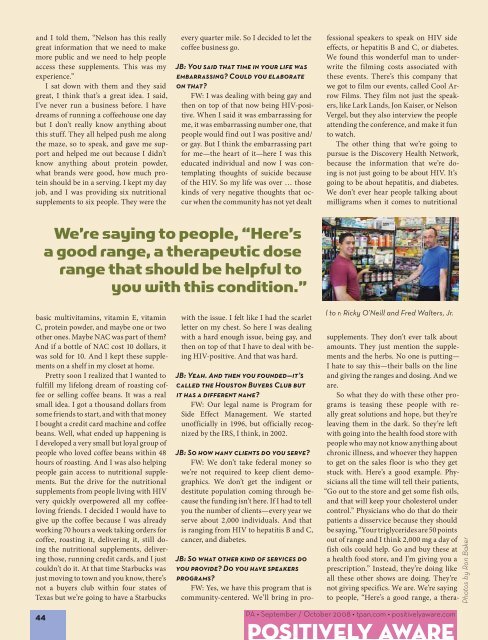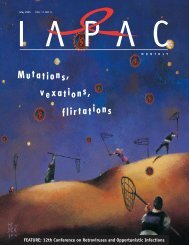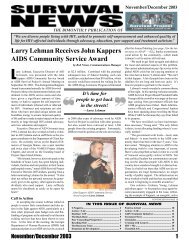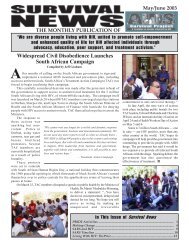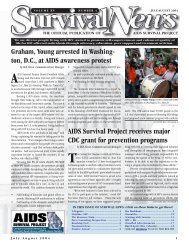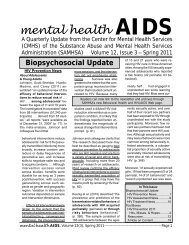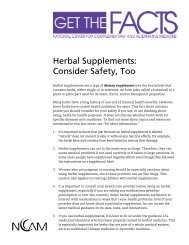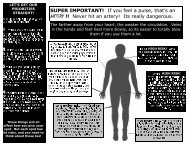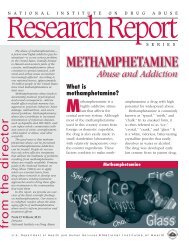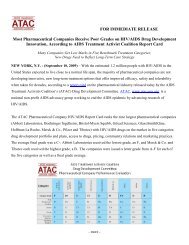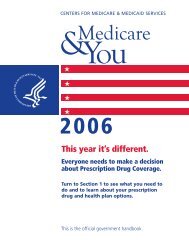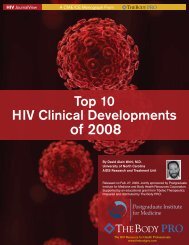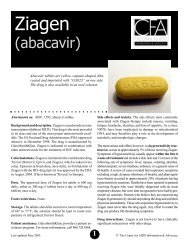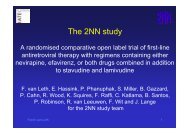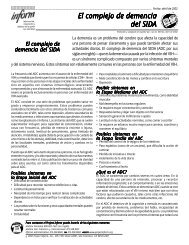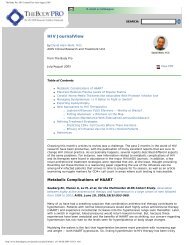WELLNESS STARTS WITH AWARENESS - CD8 T cells - The Body
WELLNESS STARTS WITH AWARENESS - CD8 T cells - The Body
WELLNESS STARTS WITH AWARENESS - CD8 T cells - The Body
You also want an ePaper? Increase the reach of your titles
YUMPU automatically turns print PDFs into web optimized ePapers that Google loves.
and I told them, “Nelson has this really<br />
great information that we need to make<br />
more public and we need to help people<br />
access these supplements. This was my<br />
experience.”<br />
I sat down with them and they said<br />
great, I think that’s a great idea. I said,<br />
I’ve never run a business before. I have<br />
dreams of running a coffeehouse one day<br />
but I don’t really know anything about<br />
this stuff. <strong>The</strong>y all helped push me along<br />
the maze, so to speak, and gave me support<br />
and helped me out because I didn’t<br />
know anything about protein powder,<br />
what brands were good, how much protein<br />
should be in a serving. I kept my day<br />
job, and I was providing six nutritional<br />
supplements to six people. <strong>The</strong>y were the<br />
basic multivitamins, vitamin E, vitamin<br />
C, protein powder, and maybe one or two<br />
other ones. Maybe NAC was part of them?<br />
And if a bottle of NAC cost 10 dollars, it<br />
was sold for 10. And I kept these supplements<br />
on a shelf in my closet at home.<br />
Pretty soon I realized that I wanted to<br />
fulfill my lifelong dream of roasting coffee<br />
or selling coffee beans. It was a real<br />
small idea. I got a thousand dollars from<br />
some friends to start, and with that money<br />
I bought a credit card machine and coffee<br />
beans. Well, what ended up happening is<br />
I developed a very small but loyal group of<br />
people who loved coffee beans within 48<br />
hours of roasting. And I was also helping<br />
people gain access to nutritional supplements.<br />
But the drive for the nutritional<br />
supplements from people living with HIV<br />
very quickly overpowered all my coffeeloving<br />
friends. I decided I would have to<br />
give up the coffee because I was already<br />
working 70 hours a week taking orders for<br />
coffee, roasting it, delivering it, still doing<br />
the nutritional supplements, delivering<br />
those, running credit cards, and I just<br />
couldn’t do it. At that time Starbucks was<br />
just moving to town and you know, there’s<br />
not a buyers club within four states of<br />
Texas but we’re going to have a Starbucks<br />
44<br />
every quarter mile. So I decided to let the<br />
coffee business go.<br />
JB: You said that time in your life was<br />
embarrassing? Could you elaborate<br />
on that?<br />
FW: I was dealing with being gay and<br />
then on top of that now being HIV-positive.<br />
When I said it was embarrassing for<br />
me, it was embarrassing number one, that<br />
people would find out I was positive and/<br />
or gay. But I think the embarrassing part<br />
for me—the heart of it—here I was this<br />
educated individual and now I was contemplating<br />
thoughts of suicide because<br />
of the HIV. So my life was over … those<br />
kinds of very negative thoughts that occur<br />
when the community has not yet dealt<br />
We’re saying to people, “Here’s<br />
a good range, a therapeutic dose<br />
range that should be helpful to<br />
you with this condition.”<br />
with the issue. I felt like I had the scarlet<br />
letter on my chest. So here I was dealing<br />
with a hard enough issue, being gay, and<br />
then on top of that I have to deal with being<br />
HIV-positive. And that was hard.<br />
JB: Yeah. And then you founded—it’s<br />
called the Houston Buyers Club but<br />
it has a different name?<br />
FW: Our legal name is Program for<br />
Side Effect Management. We started<br />
unofficially in 1996, but officially recognized<br />
by the IRS, I think, in 2002.<br />
JB: So how many clients do you serve?<br />
FW: We don’t take federal money so<br />
we’re not required to keep client demographics.<br />
We don’t get the indigent or<br />
destitute population coming through because<br />
the funding isn’t here. If I had to tell<br />
you the number of clients—every year we<br />
serve about 2,000 individuals. And that<br />
is ranging from HIV to hepatitis B and C,<br />
cancer, and diabetes.<br />
JB: So what other kind of services do<br />
you provide? Do you have speakers<br />
programs?<br />
FW: Yes, we have this program that is<br />
community-centered. We’ll bring in pro-<br />
fessional speakers to speak on HIV side<br />
effects, or hepatitis B and C, or diabetes.<br />
We found this wonderful man to underwrite<br />
the filming costs associated with<br />
these events. <strong>The</strong>re’s this company that<br />
we got to film our events, called Cool Arrow<br />
Films. <strong>The</strong>y film not just the speakers,<br />
like Lark Lands, Jon Kaiser, or Nelson<br />
Vergel, but they also interview the people<br />
attending the conference, and make it fun<br />
to watch.<br />
<strong>The</strong> other thing that we’re going to<br />
pursue is the Discovery Health Network,<br />
because the information that we’re doing<br />
is not just going to be about HIV. It’s<br />
going to be about hepatitis, and diabetes.<br />
We don’t ever hear people talking about<br />
milligrams when it comes to nutritional<br />
l to r: Ricky O’Neill and Fred Walters, Jr.<br />
supplements. <strong>The</strong>y don’t ever talk about<br />
amounts. <strong>The</strong>y just mention the supplements<br />
and the herbs. No one is putting—<br />
I hate to say this—their balls on the line<br />
and giving the ranges and dosing. And we<br />
are.<br />
So what they do with these other programs<br />
is teasing these people with really<br />
great solutions and hope, but they’re<br />
leaving them in the dark. So they’re left<br />
with going into the health food store with<br />
people who may not know anything about<br />
chronic illness, and whoever they happen<br />
to get on the sales floor is who they get<br />
stuck with. Here’s a good example. Physicians<br />
all the time will tell their patients,<br />
“Go out to the store and get some fish oils,<br />
and that will keep your cholesterol under<br />
control.” Physicians who do that do their<br />
patients a disservice because they should<br />
be saying, “Your triglycerides are 50 points<br />
out of range and I think 2,000 mg a day of<br />
fish oils could help. Go and buy these at<br />
a health food store, and I’m giving you a<br />
prescription.” Instead, they’re doing like<br />
all these other shows are doing. <strong>The</strong>y’re<br />
not giving specifics. We are. We’re saying<br />
to people, “Here’s a good range, a thera-<br />
PA • September / October 2008 • tpan.com • positivelyaware.com<br />
Positively Aware<br />
Photos by Ron Baker


